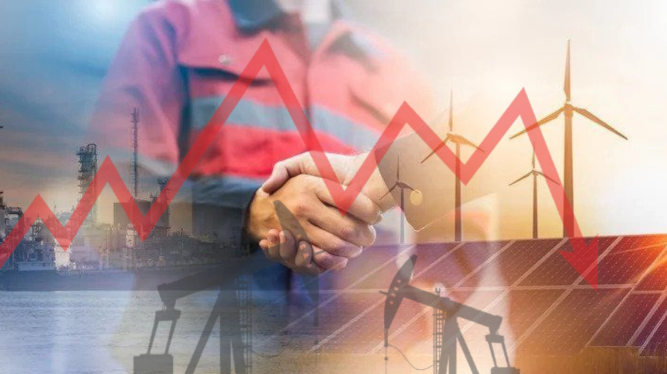Azerbaijan’s dual approach to energy security and green transition amidst global oil price decline

The energy markets have been in turmoil since the arrival of autumn, which has caught the attention of OPEC, surprising many observers. However, the situation is not as dramatic as portrayed in the media. The current oil prices strike a balance that satisfies both producers and consumers.
Global Recession of Oil Price in World Market:
Oil prices have recently fallen to their lowest in 15 months. On the London commodity exchange, "Brent" oil November futures dropped to $71 per barrel over the weekend, with the first auction of the week seeing a slight recovery to $77.63 per barrel.
Two main factors contributed to this 8% decline in oil prices over the past week. First is Libya's resumption of oil exports. The political conflict in Libya, which began at the end of August, had cut global oil supply by at least 700,000 barrels per day. The mid-week recovery of Libyan exports reassured market participants that there would be no shortage of oil, leading to daily price declines.
The second factor impacting the market was the news of weakened economic activity in major economies. This includes a reduction in oil imports by China, slowing economic growth in the European Union and the United States, and an increase in electricity generation from "green energy." These developments have also led to a drop in natural gas prices in Europe, with the selling price for 1,000 cubic metres at the Title Transfer Facility (TTF) hub falling from $432 to $425 over the week.
Gas and Energy Security: President Ilham Aliyev's strategic remarks at the Cernobbio Forum
Today's Energy supply issues demonstrate that national security is inseparable from energy security. President Ilham Aliyev emphasised this during his speech at the International Cernobbio Forum in a session titled "Azerbaijan's Role in the New Geopolitical Environment."
Highlighting the significance of the 3,500-kilometer Southern Gas Corridor that stretches from Azerbaijan to Italy and ensures the energy security of 10 countries, the President said, "We now have ten countries receiving gas from Azerbaijan, seven of which are members of the European Union. That is probably why the European Commission calls Azerbaijan a pan-European gas supplier and a reliable partner."
Azerbaijan's Commitment to "Greenization" and Sustainable Energy
As the host country of COP29, Azerbaijan is committed to addressing emerging global challenges by moving away from its historical reliance on oil and gas resources. The nation is pushing for a sustainable energy future and advancing a green economy.
Last week, Azerbaijan's Minister of Finance, Samir Sharifov, discussed plans to attract international investments for the "green transformation" of the economy in an interview with the local "Report" agency. He mentioned that preliminary projects funded by the World Bank and the European Bank for Reconstruction and Development (EBRD) to enhance Azerbaijan's energy system are nearly ready for signing. "Implementation of these projects, in turn, will prevent the country's energy network from being exposed to certain negative effects," Sharifov emphasised.
While Sharifov did not provide detailed information on the specific projects for which international loans will be utilised, it is clear that "green energy" is a primary focus. The Azerbaijani government is taking significant steps to attract private capital and secure financial resources for its green agenda. In such a scenario, obtaining long-term foreign loans appears to be a more efficient approach.
Among all the significant energy developments, the "Black Sea Green Energy Cable" project also stands out.
As part of the "Agreement on Strategic Partnership in the Field of Development and Transmission of Green Energy" signed in Bucharest on December 17, 2022, Azerbaijan, Georgia, Romania, and Hungary have established a cooperative framework. This project, known as the "Caspian-Black Sea-Europe Green Energy Corridor," aims to transport green energy generated from Azerbaijani wind power plants to Romania and, eventually, to Europe.
The agreement outlines the construction of an energy bridge from the Caucasus region to Europe, connecting Azerbaijan, Georgia, Romania, and Hungary. This project involves the development of the "Black Sea Cable," a 1,195-kilometre submarine electric cable with a capacity of 1,000 megawatts. Romanian Energy Minister Sebastian-Ioan Burdujan has highlighted the potential impact of this project on energy costs in Europe. Despite the estimated €3.5 billion cost for the submarine cable line between Georgia and Romania, Burdujan affirmed that the project would enhance energy security and market stability in the region.
The collaboration among Azerbaijan, Georgia, Romania, and Hungary underscores a collective commitment to enhancing energy security and sustainability across the region, providing a model for future transnational green energy initiatives.
What to expect for the foreseeable future:
The near future of the energy sector will be characterised by a balancing act between managing traditional energy sources and accelerating the green transition. As global dynamics continue to evolve, Azerbaijan is not only navigating the turbulent energy markets of autumn but also positioning itself as a leader in green energy, giving a glimpse of what comes by advancing initiatives that contribute to regional energy security and sustainability.
---
Follow us on Twitter @AzerNewsAz
Here we are to serve you with news right now. It does not cost much, but worth your attention.
Choose to support open, independent, quality journalism and subscribe on a monthly basis.
By subscribing to our online newspaper, you can have full digital access to all news, analysis, and much more.
You can also follow AzerNEWS on Twitter @AzerNewsAz or Facebook @AzerNewsNewspaper
Thank you!

